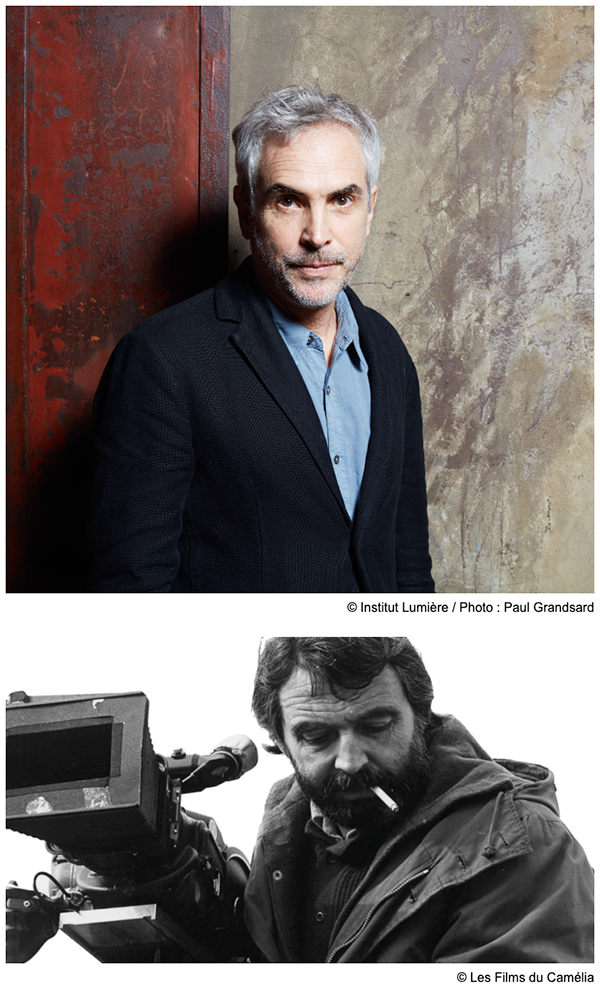The Tanner event
Posted on 19.10.2023
Who better to discuss the work of Swiss director Alain Tanner than Mexican filmmaker Alfonso Cuarón?!
Three films by Alain Tanner (1929-2022): Charles, Dead or Alive (1969), The Salamander (1971), and Jonah Who Will Be 25 in the Year 2000 (1976) are being screened at this year’s Lumière film festival, with the help of an enlightened admirer, Alfonso Cuarón. It can also be seen as the popular, sometimes Hollywood-esque, always humanist cinema of the director of Roma, Gravity and Children of Men coming face to face with Tanner's rebellious Swiss oeuvre, which had remained deliberately independent. Yet, a closer look reveals several similarities between these two cinemas. From one continent to another, from one time frame to another, the work of the two artists echoes each other.
First of all, there is the love of black and white as a modern choice, as well as a political approach, so that the viewer is always more focused on the subject, the state of the characters or the movement. For Tanner, working in black and white is like writing in-depth articles about the world in a daily newspaper. In The Salamander, the young characters, Pierre and Paul, reflect on society within the confines of a flat. In Cuarteto para el Fin del Tiempo (1983), a short film by Alfonso Cuarón in black and white, we follow the mental journey of a young man alone in his flat. When he's not thinking about his life, he goes out. Similarly, in Charles, Dead or Alive, Tanner's rebellious and curious old man walks through the city to see the outside world like the young man imagined by Cuarón.
Setting out on the road, courageously embarking on a journey in search of others, making a complete break with one's environment like Charles, the grand bourgeois, or Rosemonde, the young worker of The Salamander, is about showing solidarity with the human race. It mirrors the well-to-do family of Roma, who joins forces with Cleo, the young maid. With Tanner, going out means engaging in conversation with the city dweller, the teacher, the young cashier Jonah or the militant farmer; it means asserting your existence by communicating your opinions. This solidarity with the frailties of human nature can also be found in Children of Men.
Solidarity is also love, being alive. Alain Tanner's cinema advocates a political kind of love. When certain words, as he says in Jonah... "have lost their meaning: recession, inflation", we have to love each other. The Swiss filmmaker's protagonists follow their inclinations naturally, with tenderness and physical vigour, interspersing The Salamander, Jonah... with scenes full of fun and hearty laughter. The young protagonists in Cuarón's And Your Mother Too also have this freedom to love. You must live your life with full awareness, and every girl and man in the street has the right to make a claim, to think about his or her status as a citizen, as Tanner shows in his œuvre without cutaways, which, for him, is the hallmark of left-wing cinema.

« Jonah, Who Will Be 25 in the Year 2000, is a film that had a big influence on me. I only have one movie poster in my house, and that's Jonah. And my son is named Jonah. There's a lot of French New Wave in this film. What's more, I'd already seen Tanner's trilogy: Charles, Dead or Alive, Return from Africa and The Salamander. I really liked his way of handling the question of man in society with a certain sense of humour. Jonah is a testament to this trilogy: on the one hand, it’s a film with an absolutely giving spirit and, on the other, it’s very sad, very resigned and very bracing. A mutual friend of Tanner's told me that he had a little post-it note in his house that said ‘All utopia begins with reality’, and I think that this defines a big part of Tanner’s cinema. »
Alfonso Cuarón, 2018 Lumière film festival
Virginie Apiou
SCREENINGS INTRODUCED BY ALFONSO CUARÓN:
Institut Lumière (Hangar) - Thursday, 19 October at 2.45pm
Lumière Terreaux - Saturday, 21 October at 6pm
The Salamander by Alain Tanner (1971, 2h, VFSTA)
Lumière Terreaux – Friday, 20 October at 4.30pm
Jonah Who Will Be 25 in the Year 2000 by Alain Tanner (1976, 1h55, VFSTA)
Cinéma Comœdia - Saturday, 21 October at 5pm

